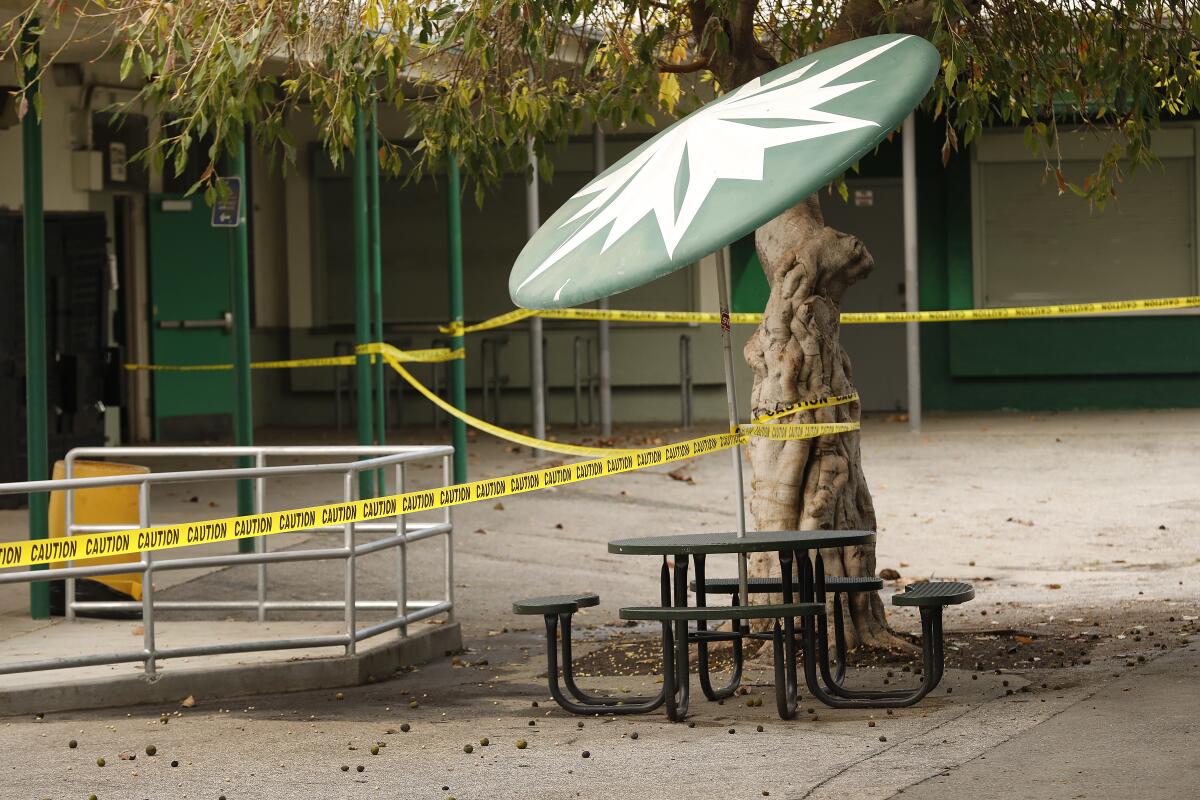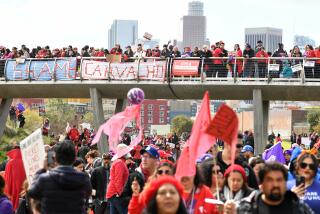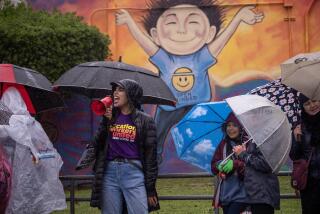Dispute between LAUSD and teachers over online learning keeps parents in limbo

With the Aug. 18 start of the school year fast approaching, parents and students face uncertainty over how online instruction will be conducted as the Los Angeles teachers union and district officials haggle over the rules and schedules for distance learning.
The union, United Teachers Los Angeles, opposes a proposal under which teachers would have to instruct students remotely while working an 8:30 a.m.-to-3 p.m. schedule that would closely mirror a traditional school day. The union has countered with a shorter work day structured somewhat differently.
The union also had objected to proposal that would have required teachers to work online from their empty classrooms, but the district dropped that demand on Wednesday, according to the union.
The secrecy around the negotiations spurred an advocacy group on Wednesday to threaten litigation against nation’s second-largest school system if it doesn’t fix instructional problems — shortcomings that many parents have complained about since campuses closed March 13.
In posted statements, union leaders had argued that forcing teachers to return to campus — even without students — would pose unnecessary health risks. Still under discussion is the option of teachers working voluntarily from their classrooms, where they would have their full instructional materials and reliable internet access.
District officials declined to discuss their proposal. In recent interviews, schools Supt. Austin Beutner has said that he and union leaders shared common cause in wanting instruction to be effective and to be carried out safely.
Apart from the lawsuit threat from a group called Parent Revolution, similar concerns are being raised by another advocacy group called Speak Up.
“Our parents should not be kept in the dark on these negotiations,” said Katie Braude, chief executive officer of Speak Up. “They should be part of this conversation. ... In the spring, LAUSD allowed live, online instruction to be optional for teachers. The result was catastrophic for our most vulnerable students.”
Both Speak Up and Parent Revolution have frequently been at odds with the teachers union over political and policy matters.
Under orders by Gov. Gavin Newsom, public and private schools located in counties on the state’s “watch list” cannot reopen for the start of school because the risks would be too great amid the ongoing COVID-19 pandemic. Campuses could potentially reopen once virus transmission recedes and stabilizes for 14 days. Elementary schools can apply for a waiver to reopen sooner.
The district and the union weathered criticism when they agreed in April to require only 20 hours of work per week from teachers. The format of instruction was essentially unspecified to give teachers and students maximum flexibility, emphasizing compassion over rigor. Many teachers said that the flexibility allowed them to work more effectively.
Some parents, however, complained of limited contact with teachers, and student engagement was disappointing and especially low among Black and Latino students and those from low-income families. Some teachers reported a decline in student effort after the district did away with failing grades and stipulated that no student would receive a final grade lower than what it was when campuses shut down.
“It is clear that the district’s distance-learning program in the spring violated students’ constitutional right to an education,” said Seth Litt, executive director of the advocacy group Parent Revolution, one of the groups that threatened litigation. “This wasn’t a natural result of COVID-19.”
“They have deprived our students of the opportunity to learn through the decisions they have made,” said Alma Solano, a parent who signed the demand letter.
Concerns over academic progress spurred state lawmakers to insert instructional requirements into the budget bill, requiring teachers to take online attendance and document student learning. The rules reimpose the state’s minimum daily instructional minutes of 180 for kindergarten, 230 minutes for grades 1 through 3, and 240 minutes for grades 4 through 12.
However, distance learning can be documented with student work as well as time spent online — which creates ambiguity and wiggle room in labor negotiations.
Nonetheless, a departure from state requirements is supposed to involve mandatory input from parents — and parent leaders and groups representing them have not been involved in the L.A. negotiations to date.
Vicky Martinez, a parent of four students at different schools, was more supportive of union priorities. She said that although the spring was “chaotic,” she saw progress in online classes during summer school.
“It’s so much better,” Martinez said.
The teachers union priorities include: an intensive focus on social and emotional needs, an instruction plan that does not rely solely on live instruction; suspending evaluations of tenured teachers for a year; more training for substitute teachers, and a maximum daily screen time of 45 minutes for children younger than 5.
One elementary principal said he was proud of what his teachers accomplished, but that more academic rigor is needed for the fall.
“From March to June it was, ‘Let’s do the best we can,’” said the principal, who works in northeast Los Angeles and requested anonymity because he was not authorized to speak. “Now there needs to be more expectations.”
A principal from the west San Fernando Valley, also speaking anonymously, acknowledged the thorniness of the issues. A set schedule would benefit many students — and teachers could work more easily from campus, both online and with their colleagues. All the same, he said, teachers had legitimate personal challenges that stood in the way of working a standard schedule on campus.
Teachers are classified as essential workers and allowed to work on campus even when children are not permitted, according to the L.A. County Office of Education.
The district also has outstanding issues with another union, Local 99 of Service Employees International, which represents most non-teaching employees. That union is seeking an expansion of custodial services at campuses in response to the pandemic, for example.
Negotiations are expected to continue throughout the week.
More to Read
Sign up for Essential California
The most important California stories and recommendations in your inbox every morning.
You may occasionally receive promotional content from the Los Angeles Times.











